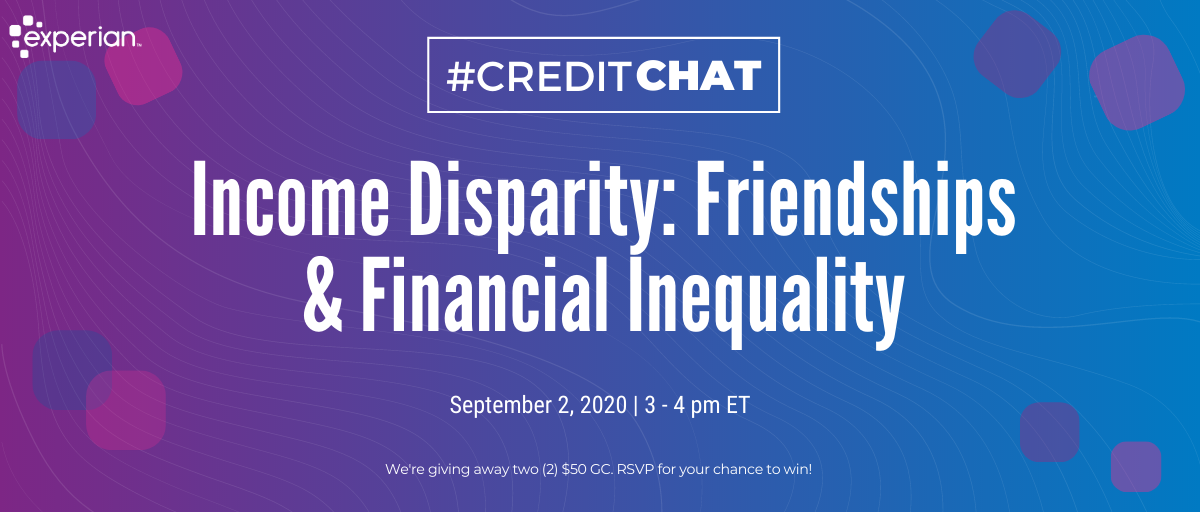Income Disparity: Friendships & Financial Inequality

Join our #CreditChat on Twitter every Wednesday at 3 p.m. ET.
The panel included Rod Griffin: Senior Director, Consumer Education and Advocacy, Experian; Christina Roman: Consumer Education and Advocacy Manager at Experian; Take Charge America; Lawrence D. Sprung: CFP® President of Mitlin Financial, Inc; Leslie H. Tayne, Esq: Founder and Managing Director of Tayne Law Group, P.C. (f/k/a The Law Offices of Leslie H. Tayne, P.C.); and Kembala Evans: Financial Coach, Speaker, and Author.
Questions We Discussed:
Q1: Has financial inequality ever been an issue in any of your relationships? If so, what happened and how did you deal with it?
Q2: How can you make talking to your friends about money less awkward?
Q3: How do you fight the urge to keep up with friends who are big spenders?
Q4: How do you deal with guilt and jealousy when your friend makes less/more money than you?
Q5: What should you do if you’re uncomfortable with friends who are being too financially generous with you?
Q6: What are some ideas for splitting the bill with your friends?
Q7: How can you establish healthy money boundaries with friends?
Q8: What are some money tips for vacationing with friends?
Q9: How do you maintain friendships when money values and salaries differ?
Q10: Any last-minute tips on dealing with friendships and financial inequality?
Retweet these insights from our community:
A1: Yes, dealing with financial inequality can be tough in a relationship. Having a conversation with your significant other can be an important test of communication. Express your feelings and see where they stand on the matter. #CreditChat
— Leslie H. Tayne, Esq (@LeslieHTayneEsq) September 2, 2020
A2: Talking about money can come up organically in your everyday conversations. Topics like your job, health insurance, and financial goals like buying a home are not necessarily taboo topics, and they can lead to deeper money discussions. #CreditChat pic.twitter.com/kODMhPUh9H
— American Consumer Credit Counseling (@ACCC_TalkCents) September 2, 2020
A3. Stay focused on your goals and your financial reality. Always remember that the temporary satisfaction of spending money is not worth long-term debt or financial hardship. #creditchat
— Take Charge America (@TCAsolutions) September 2, 2020
A4: Careers have ups & downs and some fields are more lucrative than others. Focus on improving your skills and why you’re friends in the first place. Friendship is so much more than finances. #CreditChat
— Leslie H. Tayne, Esq (@LeslieHTayneEsq) September 2, 2020
A5a. Establish spending limits when it comes to gift giving or agree to exchange homemade gifts instead of buying gifts to stay on more equal footing. #creditchat pic.twitter.com/uO9Advwqg4
— Take Charge America (@TCAsolutions) September 2, 2020
A6. When you’re out, ask for separate checks at the beginning of your meal or happy hour, rather than waiting and trying to do the split after the fact. #creditchat
— Take Charge America (@TCAsolutions) September 2, 2020
A7a. If you choose to loan a friend money, consider it a gift and be happily surprised if and when they pay it back. That way, you’re managing your own expectations and not letting resentment build if they pay it back slowly or not at all. #creditchat
— Take Charge America (@TCAsolutions) September 2, 2020
A8a. Plan a budget and make your spending limit known and stick to it. Don’t let peer pressure cause you to spend more than you can afford. #creditchat pic.twitter.com/xfHWSbRz0G
— Take Charge America (@TCAsolutions) September 2, 2020
A9: When your money values or salaries differ, sometimes that means opting out of activities with those friends. It doesn’t mean you can't spend time with them, but if they often do things that you can’t afford, don’t go into debt trying to keep up with them. #CreditChat
— American Consumer Credit Counseling (@ACCC_TalkCents) September 2, 2020
A10: Money can create tension in friendships, but it doesn’t have to. Having a conversation and clearing the air about financial expectations is much less uncomfortable than silence. #CreditChat
— Leslie H. Tayne, Esq (@LeslieHTayneEsq) September 2, 2020